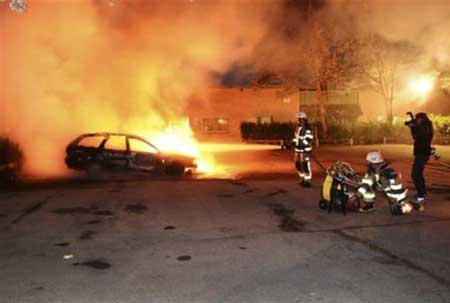 |
| 2013年5月21日,斯德哥尔摩郊区骚乱,消防队员正在扑灭燃烧汽车上的火焰。 |
|
Hundreds of youth have torched cars and attacked police in four nights of riots in immigrant suburbs of Sweden's capital, shocking a country that dodged the worst of the financial crisis but failed to solve youth unemployment and resentment among asylum seekers. Violence spread from the North to the South of the city on Wednesday as groups of youth pushed throughStockholm's suburbs casting stones, breaking windows and setting cars alight. Police in the southern Swedish city of Malmo said two cars had been set ablaze. Local media said a police station office was set on fire in the southern suburb of Rågsved, where several people were also detained. No one was hurt and the fire was quickly put out. The attackers have awaited nightfall before setting out, defying a call for calm from the country's prime minister and damaging stores, schools, a police station and an arts and crafts centre in the four days of violence. "I think there is a feeling that we need to be in more places tonight," said Towe Hagg, spokeswoman forStockholm police. One police officer was injured in the latest attacks and five were arrested for attempted arson. Selcuk Ceken, who works at a local youth activity centre in Hagsatra, said between 40 and 50 youths threw stones at police and smashed windows, then ran off in different directions. He noted the people were in their 20s and seemed well organized. "It's difficult to say why they're doing this," he said. "Maybe it's anger at the law and order forces, maybe it's anger at their own personal situation, such as unemployment or having nowhere to live." The riots appear to have been sparked by the police killing of a 69-year-old man wielding a machete in the suburb of Husby this month, which prompted accusations of police brutality. The riots then spread from Husby to other poor Stockholm suburbs. "We see a society that is becoming increasingly divided and where the gaps, both socially and economically, are becoming larger," said Rami Al-khamisi, co-founder of Megafonen, a group that works for social change in the suburbs. "And the people out here are being hit the hardest ... We have institutional racism." The riots were less severe than those of the past two summers in Britain and France but provided a reminder that even in places less ravaged by the financial crisis than Greece or Spain, state belt-tightening is toughest on the poor, especially immigrants. "The reason is very simple. Unemployment, the housing situation, disrespect from police," said Rouzbeh Djalaie, editor of the local Norra Sidan newspaper, which covers Husby. "It just takes something to start a riot, and that was the shooting." IDENTITY CHECKS Djalaie said youths were often stopped by police in the streets for unnecessary identity checks. During the riots, he said some police called local youths "apes." The television pictures of blazing cars come as a jolt to a country proud of its reputation for social justice as well as its hospitality towards refugees from war and repression. "I understand why many people who live in these suburbs and in Husby are worried, upset, angry and concerned," said Justice Minister Beatrice Ask. "Social exclusion is a very serious cause of many problems, we understand that." After decades of practicing the "Swedish model" of generous welfare benefits, Stockholm has been reducing the role of the state since the 1990s, spurring the fastest growth in inequality of any advanced OECD economy. While average living standards are still among the highest in Europe, successive governments have failed to substantially reduce long-term youth unemployment and poverty, which have affected immigrant communities worst. Some 15 percent of the population are foreign-born, and unemployment among these stands at 16 percent, compared with 6 percent for native Swedes, according to OECD data. Youth unemployment in Husby, at 6 percent, is twice the overall average across the capital. The left-leaning tabloid Aftonbladet said the riots represented a "gigantic failure" of government policies, which had underpinned the rise of ghettos in the suburbs. As unemployment has grown, the anti-immigrant Sweden Democrats party has risen to third in polls ahead of a general election due next year, reflecting many voters' worries that immigrants may be partly to blame. ASYLUM NUMBERS RISING While many of the immigrant population are from Nordic neighbors closely tied to Sweden by language or culture, the debate has tended to focus on poor asylum seekers from distant war zones. Out of a total 103,000 immigrants last year, 43,900 were asylum seekers, almost 50 percent up from 2011. Nearly half of these were refugees from fighting in Syria, Afghanistan or Somalia, and will get at least temporary residency. Among 44 industrialized countries, Sweden ranks fourth in the absolute number of asylum seekers, and second relative to its population, according to U.N. figures. Policing in Stockholm has already been the focus of controversy this year, with allegations that police were picking out darker-skinned immigrants for identity checks in subway trains.
|
据外国媒体5月23日报道,瑞典首都斯德哥尔摩移民区连续四天晚上爆发骚乱,数以百计的年轻人焚烧汽车、袭击警察。骚乱震惊了瑞典。 22日,暴力行动由北向城市南部蔓延,成群年轻人穿越市郊,投掷石头,打碎窗户,点燃汽车。瑞典南部城市马尔默的警察透露,有两辆汽车被点燃。 当地媒体报道称,斯德哥尔摩南郊拉格斯维德的警察局起火,有几个人被拘留。不过,火势很快被扑灭,也没有人员伤亡。 攻击者无视瑞典首相呼吁冷静,在夜幕降临后出动。在四天的暴力行动中,一些商店和学校遭到破坏、一个警察局和一所工艺美术中心也被殃及。 斯德哥尔摩警察局女发言人特维·黑格说,“我感觉,今天晚上我们需要在更多的地方。”在最近的袭击中,一名警官受伤,5人涉嫌纵火未遂被捕。 在哈格塞特拉青年活动中心工作的塞尔丘克·切肯说,四五十名青年向警察投掷石头,砸碎窗户,然后四散而逃。他注意到,那些人20多岁,似乎组织有序。他还说,“很难说他们为什么这么做。也许是怨恨法治部门,也许因为不满个人处境,例如失业或没有住处。” 本月,警察杀死一名在赫斯比郊区手持砍刀的69岁男子,引发对警察暴行的职责。骚乱似乎源自此事,并从赫斯比蔓延到斯德哥尔摩其他贫穷郊区。 社会组织Megafonen创始人拉米·哈米斯说,“我们看到社会日益分化,社会和经济差距越来越大。这里的人正在受到最严重的打击。我们存在制度上的种族歧视。” 此次骚乱虽然没有过去两年夏季英国和法国骚乱那么严重,但是提醒世人即使在遭受金融危机打击比希腊或西班牙小的国家,对穷人,尤其是移民来说,紧缩政策也极其难熬。 “原因非常简单:失业、住房情况、警察无礼。”当地报纸编辑鲁兹贝赫说,“引发骚乱只需要干点事情,那就是开枪。” 身份检查 鲁兹贝赫说,警察经常在街上拦住年轻人,进行无必要的身份检查。在骚乱期间,有些警察称当地年轻人“大猩猩”。 汽车燃烧的电视画面震惊了这个以社会公正、善待难民著称的国家。司法大臣比阿特丽斯·阿斯克说,“我理解住在这些郊区和赫斯比的许多人担忧、不安、愤怒和关切的原因。社会排斥引发许多问题,我们理解。” 实行以福利著称的“瑞典模式”几十年之后,自上世纪90年代以来,斯德哥尔摩一直在削减政府角色,不平等迅速增加,甚于何发达的经合组织成员。 虽然平均生活标准依然在欧洲高居榜首,多届政府未能有效减少青年长期失业和贫困问题,移民社区最受影响。 经合组织的数据显示,瑞典约15%的人口出生在国外,这些人的失业率高达16%,而瑞典本地人失业率为6%。 赫斯比青年失业率为6%,是斯德哥尔摩平均失业率的两倍。 《瑞典晚报》(Aftonbladet)称,骚乱体现了政府政策的“巨大失败”。 随着失业率的增长,反移民的瑞典民主党在明年大选前的民调中已跃居第三位,反映了许多选民的担心,而移民可能是部分原因。 难民增加 许多移民来自在语言或文化上都与瑞典关系密切的北欧邻国,穷苦的战争难民成为争论焦点。 瑞典去年移民总数为10.3万,其中4.39万人是难民,比2011年几乎增加了50%。这些人中将近一半是来自叙利亚、阿富汗或索马里战区的难民,至少将得到临时居住权。 联合国数据显示,在44个工业化国家中,在入境难民的绝对数量上,瑞典排名第四。 今年,斯德哥尔摩警察行为已成争议焦点,有人指控称警方在地铁上对肤色较黑的移民进行身份检查。 相关阅读
(翻译:yuanlu 编辑:Julie) |
|
|